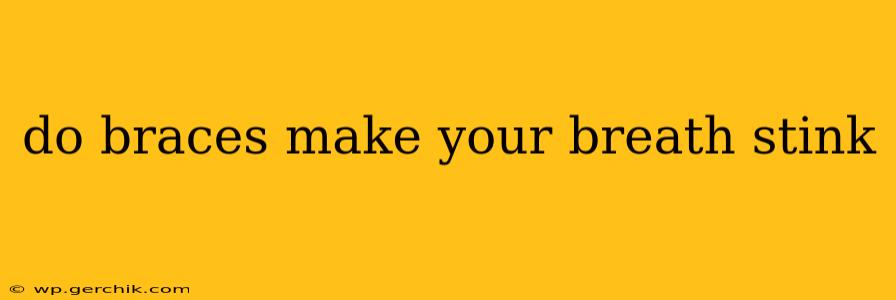Do Braces Make Your Breath Stink? A Comprehensive Guide
Yes, braces can contribute to bad breath, but it's not the braces themselves that cause the problem. The issue stems from the way braces affect oral hygiene and create environments where bacteria thrive. This article will explore the reasons why braces might lead to halitosis (bad breath) and provide practical solutions to keep your breath fresh and your smile healthy.
Why Do Braces Make Breath Smell Worse?
The primary reason braces can lead to bad breath is the increased difficulty in cleaning your teeth and gums thoroughly. The brackets and wires of braces create more nooks and crannies where food particles and plaque can easily get trapped. This buildup of food debris provides a breeding ground for bacteria, leading to the production of volatile sulfur compounds (VSCs), the primary culprits behind bad breath.
What Foods Make My Breath Smell Worse When I Have Braces?
Certain foods are notorious for exacerbating bad breath, especially when wearing braces. These include:
- Sugary foods and drinks: These feed the bacteria in your mouth, leading to increased plaque buildup and a more potent odor.
- Onion and garlic: These pungent foods are absorbed into your bloodstream and released through your breath, making their odor linger for hours.
- Dairy products: While not as potent as onion or garlic, dairy can contribute to bad breath due to their protein content, which bacteria can break down.
- Strong-smelling spices: Similar to onions and garlic, spices can leave a lingering odor.
How Can I Prevent Bad Breath With Braces?
Maintaining excellent oral hygiene is crucial for preventing bad breath when wearing braces. Here's how:
- Brushing: Brush your teeth thoroughly at least twice a day, for two minutes each time. Use a soft-bristled toothbrush and fluoride toothpaste, paying close attention to the areas around the brackets and wires. Consider using an interdental brush to clean between your teeth and under the wires.
- Flossing: Flossing is even more important with braces. Use a floss threader to get the floss under the wires and clean between each tooth effectively.
- Mouthwash: Using a therapeutic mouthwash, especially one containing fluoride or chlorhexidine, can help kill bacteria and freshen breath.
- Regular Dental Checkups: Schedule regular checkups and cleanings with your orthodontist to remove plaque and tartar buildup that you might miss during home cleaning. Your orthodontist can also detect any problems early.
- Diet: Limit sugary foods and drinks, as well as strong-smelling foods like onions and garlic. Drinking plenty of water throughout the day can help rinse away food particles and keep your mouth hydrated.
Does Bad Breath Mean I Have Gum Disease?
While bad breath with braces is often related to poor cleaning, it's crucial to note that persistent bad breath, especially accompanied by bleeding gums or swelling, could indicate gum disease (gingivitis or periodontitis). Gum disease is more likely to develop with braces due to the difficulty in cleaning, making regular dental visits even more essential. If you notice any concerning symptoms, consult your orthodontist or dentist immediately.
Can Braces Cause Dry Mouth?
Dry mouth can also contribute to bad breath. Some medications or medical conditions can cause dry mouth, but it can also be a side effect of certain orthodontic procedures or appliances. Dry mouth reduces saliva production, which is crucial for neutralizing acids and rinsing away food particles. If you experience dry mouth, talk to your orthodontist or doctor; they can suggest ways to manage it.
By diligently following these tips, you can effectively minimize bad breath while wearing braces and maintain a healthy, fresh-smelling smile. Remember, prevention is key! Regular oral hygiene and professional dental care are your best allies in achieving this goal.
